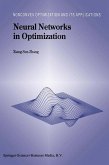This volume selects 77 papers from over 300 presented at the conference. With this new volume, Unifying Themes in Complex Systems continues to build common ground between the wide-ranging domains of complex systems science.
Dieser Download kann aus rechtlichen Gründen nur mit Rechnungsadresse in A, B, BG, CY, CZ, D, DK, EW, E, FIN, F, GR, HR, H, IRL, I, LT, L, LR, M, NL, PL, P, R, S, SLO, SK ausgeliefert werden.
"This is a useful volume. ... Each of the chapters is a summary of one of the presentations given from June 25 through June 30, 2006 at the Sixth International Conference on Complex Systems ... . The chapters are short (six to eight pages) and highly condensed ... . this volume offers such a wide range of concepts, methods, and applications, anyone involved in the sciences of complexity will find many of these chapters stimulating." (John Bragin, Journal of Artificial Societies and Social Simulation, February, 2011)









